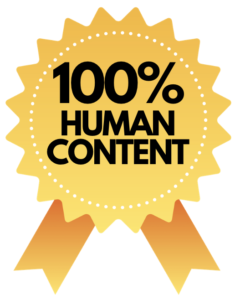
I recently engaged in an energized LinkedIn discussion with Frank Prendergast and Jason Ranalli. We were trying to discern the “Milli Vanilli Line” when it comes to personal disclosure and AI. Never heard of it? It’s probably going to impact you soon, so let’s dive into it …
How much authenticity can we lose?
The debate began with Frank’s comment on my recent blog post (Where humans thrive in the hierarchy of AI content):
“If I read a blog post from someone on the assumption it’s written by them, and I find out it was actually AI, I’ll feel cheated,” Frank said, “like I’ve been a victim of the old bait-and-switch.
“But where’s my line? Is 20% AI OK? 40%? 60? I have no idea. And how would it even be measured?
“Will that question be a thing of the past when AI is ubiquitous?”
How much authenticity are we willing to lose?
ChatGPT makes everyone a competent writer, just like the calculator made everyone competent at math in the 1980s. We don’t feel compelled to declare to the world that we use a calculator to do our taxes or run a business. When does AI simply become … life?
The Milli Vanilli Line
Now let’s get to the Milli Vanilli part.
 In 1989, Milli Vanilli rose from obscurity to superstardom almost overnight. Their debut album sold over 8 million copies and spawned three Number One singles. All of that was swept into the dustbin of pop history by disgrace.
In 1989, Milli Vanilli rose from obscurity to superstardom almost overnight. Their debut album sold over 8 million copies and spawned three Number One singles. All of that was swept into the dustbin of pop history by disgrace.
By the time Milli Vanilli accepted their Grammy award for Best New Artist in 1990, many in the music business had suspected something was wrong with this duo. It was soon revealed the two singers — Rob Pilatus and Fabrice Morvan — never sang on any of their recordings and lip-synced live performances. The ruse torpedoed the act – radio stations stopped playing their songs, fans destroyed their records, and the Grammys rescinded their award for the only time in history.
Milli Vanilli became cultural shorthand for hubris and deceit.
Jason Ranalli provided his observation:
“Anyone remember Milli Vanilli back in the 80s? BIG scandal because we all felt cheated that they didn’t actually sing the songs themselves — they had zero part in the production other than lip-syncing and dancing.
“How did the world react? We rejected them entirely and stripped them of their Grammy.
“What are we doing now with AI content? Well, the line is somewhere between singing yourself and a TON of auto-tune/effects.
“Perhaps AI ends up drawing the same muddy lines of authenticity.”
The fellas in Milli Vanilli were clear-cut cheats. An absolute. But how do we interpret “cheating” in a world where everyone can get an AI-assist on their writing, their voice, their music, and even a LinkedIn headshot? Let’s look at a couple of scenarios.
Crossing the Milli Vanilli Line
Weeks after ChatGPT entered the scene, a friend asked me to help promote his new book, which I discovered was entirely written by ChatGPT. Literally, he had just cut and pasted responses to prompts into a manuscript. There was no human commentary, editing, or insight whatsoever.
Although he was transparent about the AI assist, he put his name on the book as the author.
I told him I would not promote the book and observed that this was the very worst use of ChatGPT imaginable. In essence, he was lip-synching his book. He crossed the Milli Vanilli Line.
Example two: I have a friend who, by her own admission, is a terrible writer. Once she discovered ChatGPT, she told me that she could put her ideas into this machine and create serviceable content for the first time in her life.
“I can blog every day,” she exclaimed, “I could even write a book!”
This is the beauty of AI — unleashing a new creative power in a person with a creative deficit. She’s not lip-synching. She’s the author of her work with a little auto-tune to keep her on key!
In between these two extremes, we face nuanced ethical decisions about ownership, authorship, and authenticity.
We face these decisions now
Today, or in the near future, every one of us will have an opportunity to cross the Milli Vanilli Line.
What percent of AI work can we still claim as ours, as “authentic?”
I haven’t used AI in any of my writing. My blog posts are my stories and observations and insights about our marketing world. It’s faster and easier just to be “me” than try to prompt a bot into it! Could AI have written this post? No, at least not as effortlessly as me pecking on a keyboard for an hour. I am uniquely connecting dots, creating something unique, insightful, and connected to my own life experience.
But what about my next book? Could I edge towards the Milli Vanilli Line?
My last book, Belonging to the Brand was finished about a month before ChatGPT was unleashed. One of my first AI experiments was to ask ChatGPT to write an essay based on an idea from the book, in the voice of Mark Schaefer, with academic references. It did it. It did it well … and in five seconds.
It would have taken me a day to write that essay. So in the future, I’d feel stupid not to use AI to some degree and save days, or even weeks, of my life!
But another choice might be … to be stupid and keep doing it the hard way. Or, maybe it’s the right way — to just always be me. Perhaps my reward is in the toil that comes with authenticity.
I never want to explain to somebody how close I am to the Milli Vanilli Line.
 Mark Schaefer is the executive director of Schaefer Marketing Solutions. He is the author of some of the world’s bestselling marketing books and is an acclaimed keynote speaker, college educator, and business consultant. The Marketing Companion podcast is among the top business podcasts in the world. Contact Mark to have him speak at your company event or conference soon.
Mark Schaefer is the executive director of Schaefer Marketing Solutions. He is the author of some of the world’s bestselling marketing books and is an acclaimed keynote speaker, college educator, and business consultant. The Marketing Companion podcast is among the top business podcasts in the world. Contact Mark to have him speak at your company event or conference soon.


